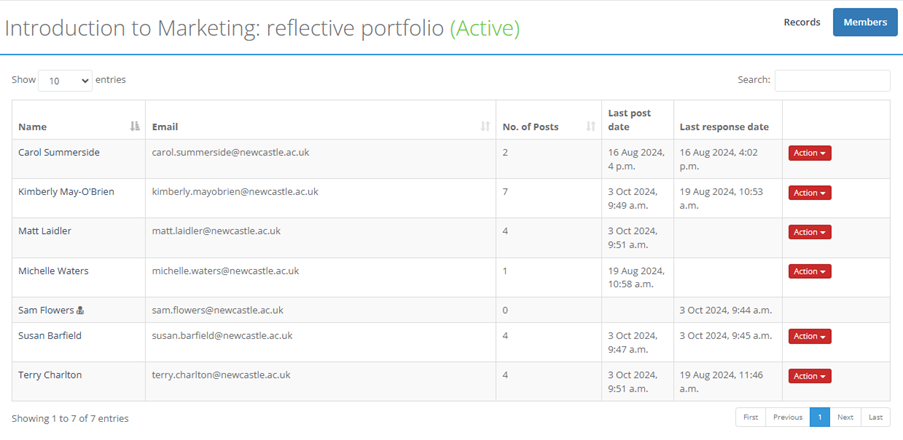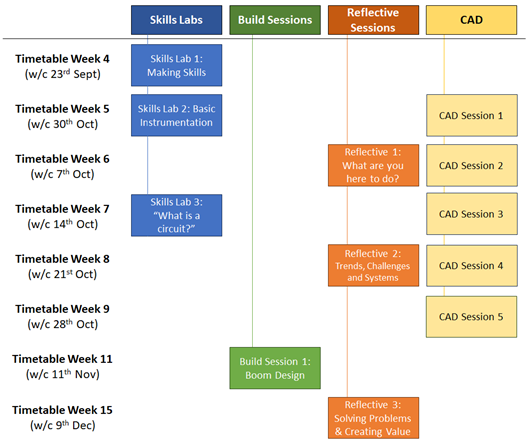Miss Katie Wray, Senior Lecturer
School of Engineering
Faculty of Science Agriculture and Engineering
What did you do?
The MSc Renewable Energy Enterprise and Management (REEM) programme pioneered an innovative reflective portfolio approach that was subsequently adapted for first-year undergraduate engineering students. Our goal was to create an assessment method that would help students connect their learning across modules and develop critical self-reflection skills.
We repurposed an existing Research, Communication and Professional Skills module (first introduced as 25% of a 30 credit module in 2023/24 then used in further modules) to provide a structured yet flexible platform for students to capture their holistic learning journey. The core innovation was moving beyond traditional assessment to encourage students to document and reflect on learning experiences both inside and outside the classroom.

A screenshot of the reflective portfolio interface. (Please note this is a mock example to protect GDPR)
Discover more about NU Reflect on the LTDS website pages.
Who is involved?
Katie Wray – Senior Lecturer from SAgE
Sam Flowers – Learning Enhancement & Technology Adviser from LTDS
Simon Cottrell – Faculty TEL Deputy Manager from FMS TEL
David Gillies – Learning Technologies Developer from FMS TEL
How did you do it?
Addressing Challenges in First-Year Engineering
The most significant challenge was transforming how first-year engineering students approach learning. Traditionally, the first-year curriculum focuses heavily on establishing fundamental engineering principles within a compulsory, structured framework. Our approach sought to break this mould by inspiring students to explore learning opportunities beyond their prescribed modules.
Initially, we attempted to provide a checklist of 28 predefined activities for reflection. However, this approach backfired – students simply recounted activities they had already been assessed on, missing the deeper purpose of reflective practice. We quickly pivoted to a more open-ended strategy.
A New Approach to Reflection
Our revised method encouraged students to reflect on activities both within and beyond their formal curriculum. We highlighted diverse learning experiences such as:
- User interaction projects
- Makerspace prototyping
- Engaging with experts and stakeholders
- Employer interactions
- Exploring resources beyond reading lists
- Developing collaborative team working skills
We supported this approach through three 3-hour workshops focusing on learning preferences, team dynamics, and innovation.

Module timetable showing Reflective Sessions
The final assessment required students to submit 15 posts that they believed best captured their learning journey.
Find out more about the NU Reflect tools.
Watch this video on Reflective Templates and this video on NU Reflect Bitesize Share Groups.
Key Design Principles
- Flexibility: Allow students to capture learning in their own unique way
- Evidenced: we required students to attach photos/sketches to evidence that it was their own work
- Self-Directed Learning: Encourage exploration beyond formal curriculum
- Personal Growth: Focus on individual learning and development
Why did you do it?
The primary motivation was to prepare students for the evolving demands of the engineering profession. Employers consistently emphasize the importance of graduates who understand how to learn, adapt, and grow. Our NU Reflect approach aimed to give students a platform to develop and showcase these critical meta-learning skills.
We explicitly encouraged students to make their reflections engaging by incorporating:
- Sketches
- Diagrams
- Photos
- Links
- Videos
Crucially, we moved beyond traditional reflective assessments that often reward positive narratives. Instead, we focused on students demonstrating their personal growth, behavioural changes, and future learning strategies.
Learn about Reflective Practice.
Does it work?
Student Engagement
While students were not immediately comfortable with reflective practice, particularly in engineering, they began to demonstrate an understanding of its value. The approach seemed particularly effective when students could look back and connect their experiences retrospectively.
One MSc student powerfully articulated this transformation:
“Reflecting now, I see that my understanding has evolved significantly. Initially, my reflections were more descriptive, focused on summarizing what I had learned in modules. Now, I realize that true reflection involves connecting those learnings to real-world issues, evaluating my own growth, and acknowledging the influence of external factors.”
Staff Perspective
The approach proved remarkably successful from an assessment perspective. Using NU Reflect’s Share Groups functionality with an assessment rubric meant that the portfolios could be marked efficiently. The quantitative assessment rubric gave clarity and confidence in the marking process.
Colleagues teaching first-year engineering reported that the portfolios offered more insightful feedback than traditional module evaluations. Some were so impressed that they began adopting the methodology in other modules.
Learn about using Share Groups for student portfolios.
Looking Forward
We continue to iterate and refine our approach. Our goal remains to help students recognize that learning extends far beyond lecture halls and reading lists. By encouraging self-directed exploration and deep reflection, we’re preparing students not just for their current studies, but for lifelong learning and professional adaptability.
We welcome thoughts, comments, and ideas from educators interested in developing reflective practice. Together, we can continue to innovate and enhance student learning experiences.
Look out for any workshops or development opportunities.
The Graduate Framework
This case study demonstrates the following attributes:
- Future focused
- Digitally capable
- Curious
- Collaborative
- Engaged
